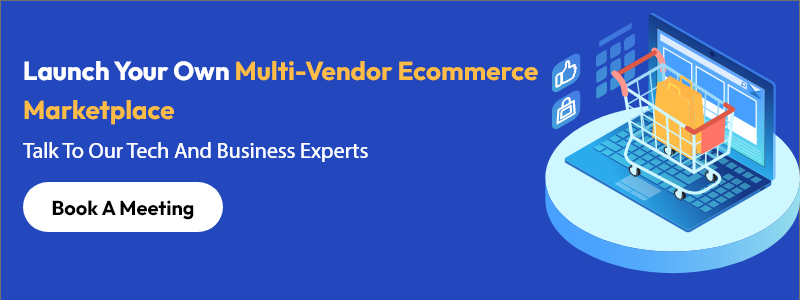When it comes to shopping, the rise of online selling platforms has changed the way products are sold and customers’ approach to buying. Businesses of all sizes, from solopreneurs to multinational conglomerates, now have unprecedented access to a worldwide audience thanks to these platforms.
Online shopping has transformed the game for both buyers and merchants, completely altering the distribution and marketing landscapes. In this blog, we will explore the best online selling platforms that have consistently stood out in the market.
The Best Online Selling Platforms For Businesses
Here we have some of the best online selling platforms that are widely used by entrepreneurs and businesses worldwide.
Facebook Marketplace
Facebook Marketplace is a digital marketplace where users of the popular social media platform, Facebook, can buy, sell, and trade items with people in their local area or from businesses. Launched in October 2016, it has quickly become a popular platform for peer-to-peer transactions, offering a wide variety of items from second-hand goods to new products from businesses.
Pros
Community-Based: One of the biggest advantages of Facebook Marketplace is its integration with the Facebook community. Users can easily buy and sell within their local area, making the transaction process more personal and secure.
Ease of Use: The platform is user-friendly, with a simple listing process. Users can quickly upload photos and descriptions of their items directly from their smartphones.
No Listing Fees: There are no fees to list items on Facebook Marketplace, making it an attractive option for casual sellers and individuals looking to declutter without additional costs.
Social Media Integration: Sellers can leverage their personal networks by sharing listings with friends or groups on Facebook, enhancing the visibility of their items.

Cons
Limited Payment and Shipping Options: Facebook Marketplace primarily relies on local pickup and cash transactions, although it has been introducing more options. This can be less convenient compared to platforms with built-in payment and shipping solutions.
No Seller Protection: Unlike some other platforms, Facebook Marketplace doesn’t offer much in the way of seller protection, which can lead to issues if disputes arise between buyers and sellers.
Scams and Flaky Buyers/Sellers: As with any open marketplace, there’s a risk of encountering scams, as well as flaky buyers or sellers who may not follow through with transactions.
Limited Customer Support: If issues arise, Facebook Marketplace offers limited customer support options, which can be a drawback for those who encounter problems during their transactions.
Shopify
Shopify is a customisable e-commerce platform that allows individuals and businesses to create their own online stores. It provides a range of tools and features designed to help sellers manage their online presence, inventory, sales, and payments. Since its inception in 2006, Shopify has grown to become one of the leading e-commerce solutions in the market, empowering merchants of all sizes to start, grow, and manage their businesses online.
Pros
Customizable Storefronts: With a variety of themes and a flexible design system, Shopify allows users to customise their storefronts to match their brand identity.
Integrated Payment Processing: Shopify Payments simplifies the transaction process by allowing sellers to accept a wide range of payment methods directly through the platform.
Robust App Ecosystem: The Shopify App Store offers a multitude of plugins and apps that extend the functionality of a store, from marketing tools to accounting and inventory management.
Reliable Hosting and Security: Shopify provides secure and reliable hosting for online stores, ensuring that websites load quickly and are protected against online threats.
Cons
Monthly Fees and Transaction Costs: Shopify charges a monthly subscription fee, and while Shopify Payments eliminates transaction fees, using external payment gateways incurs additional fees.
Limited Customization Without Coding: While Shopify is customizable, merchants with specific needs may require custom coding or apps, which could add complexity and cost.
Content Management Limitations: Although Shopify excels in e-commerce, its blogging and content management features are not as robust as specialised content platforms.
Learning Curve for Advanced Features: Beginners may find Shopify easy to use, but mastering its more advanced features and analytics may require a learning curve.
AliExpress
AliExpress is a global retail marketplace owned by Alibaba Group, based out of China. It connects international buyers with Chinese businesses, offering a vast variety of products at relatively low prices. Unlike Alibaba, which caters to wholesale transactions, AliExpress is focused on smaller consumer purchases, allowing individual customers to buy single items if they wish.
Pros
Extensive Product Range: AliExpress offers an incredibly wide selection of products, ranging from electronics, fashion, and toys to home appliances and tools.
Competitive Pricing: Due to the direct-from-manufacturer model, prices on AliExpress are often lower than on other platforms, making it appealing for bargain hunters.
Buyer Protection: AliExpress provides a comprehensive buyer protection system that includes full refunds if an item doesn’t arrive or isn’t as described.
Global Shipping: Many sellers on AliExpress offer international shipping, although shipping times may vary significantly.
Cons
Quality Concerns: The quality of products can be inconsistent, and because products are often cheaper, they may not always meet high quality standards.
Language and Communication Barriers: While AliExpress has made strides in translation, there may still be language barriers when communicating with sellers.
Customs and Import Duties: Buyers may have to pay additional customs fees or import taxes upon the arrival of their goods, depending on their country’s regulations.
BigCommerce
BigCommerce is an established e-commerce platform that provides businesses with a robust set of tools to build and manage online stores. It offers a cloud-based solution that caters to a range of business sizes, from small startups to large enterprises. BigCommerce is recognized for its comprehensive set of built-in features and its ability to scale with the growth of a business.
Pros
Built-in Features: The platform includes a wide array of out-of-the-box features such as SEO tools, marketing features, and analytics, reducing the need for additional apps or software.
No Transaction Fees: Unlike some other e-commerce platforms, BigCommerce does not charge transaction fees on sales, allowing merchants to save money on each transaction.
Multi-Channel Selling: BigCommerce supports multi-channel selling, allowing merchants to sell on various platforms like Facebook, Instagram, and Amazon directly from their BigCommerce dashboard.
Responsive Design: Templates and themes available on BigCommerce are responsive, meaning they automatically adjust the webpage content for better user experience on desktops, tablets, and smartphones.
Cons
Complexity: The features and customisation options can be overwhelming for beginners or those without technical expertise.
Limited Free Themes: Compared to some other platforms, BigCommerce has a smaller selection of free themes, which might require additional investment.
Less App Selection: Although it has a comprehensive set of built-in features, BigCommerce has a smaller third-party app marketplace compared to some competitors, which may limit integration options.

Wix Marketplace
Wix Marketplace is a part of the larger Wix ecosystem, which primarily offers website creation services. Within this ecosystem, Wix provides tools and solutions for users to design and develop their own websites, and Wix Marketplace serves as a hub where Wix users can connect with professional service providers, such as web designers, developers, and marketers, to help build or enhance their Wix websites.
Pros
Intuitive Website Builder: Wix offers a drag-and-drop website builder, making it easy for users to create and customise their online stores without any coding knowledge.
All-in-One Solution: Wix provides hosting, domain registration, and design tools in one place, simplifying the process of setting up an online store.
Marketing Tools: Wix includes a range of marketing tools, such as email marketing and social media integrations, to help store owners promote their products.
App Market: Wix’s App Market has numerous apps and services that can be added to a store to extend its functionality, like adding reviews, loyalty programs, and more.
Cons
Limited E-commerce Features on Basic Plans: The e-commerce features might be limited on lower-tier plans, necessitating an upgrade to more expensive plans for full functionality.
Transaction Fees: Some Wix plans may include transaction fees, which can add to the cost of selling products or services.
Less Specialized for E-commerce: Unlike platforms like Shopify or BigCommerce, which are dedicated e-commerce solutions, Wix is primarily a website builder that offers e-commerce as one of many features.
Template Restrictions: Once you choose and publish a template for your Wix site, you cannot change it without creating a new site, which could be inconvenient for store owners wanting to refresh their store’s design.
Etsy
Etsy is an online marketplace that specialises in handmade, vintage, and craft supply items. It serves as a unique platform for artists, craftsmakers, and collectors to sell their goods to a global audience. Founded in 2005, Etsy has carved out a niche for itself by focusing on creative, original, and often personalised products that are not typically found on larger, mass-market online retail sites.
Pros
Niche Market: Etsy’s focus on unique, handmade, and vintage items attracts a specific audience looking for original and artisanal products, which can be beneficial for sellers in this space.
Easy to Set Up: Sellers can set up an Etsy shop quickly and with ease, making it an accessible platform for small business owners and hobbyists.
Community Support: Etsy has a strong sense of community and provides various forums and teams where sellers can connect, share advice, and offer support to each other.
Seller Tools: Etsy provides a range of tools to help sellers manage their shops, including marketing and analytics tools to track performance and optimise sales.
Cons
Fees: Etsy charges a listing fee for each item, a transaction fee on sales, and a payment processing fee. These can add up, especially for sellers with a large number of listings or high-volume sales.
Competition: Due to its popularity, there is significant competition among sellers, which can make it challenging to stand out and can sometimes lead to a race to the bottom in terms of pricing.
Restricted Product Categories: Etsy is specifically for handmade, vintage, and craft supplies. Sellers with products outside these categories must find alternative platforms.
Taobao
Taobao is a Chinese online shopping website owned by Alibaba Group. Taobao is one of the world’s largest e-commerce platforms, often compared to eBay and Amazon. It caters primarily to consumers in Chinese-speaking regions and is known for its wide range of products, from everyday items to unusual and unique finds.
Pros
Innovative Features: Taobao is known for integrating social commerce features, including live streaming and interactive storefronts, which enhance the shopping experience.
Integrated Ecosystem: Taobao is part of Alibaba’s larger ecosystem, which includes Alipay for secure payments and Cainiao for logistics, providing a seamless end-to-end shopping experience.
Cons
Language Barrier: Taobao is primarily designed for the Chinese market, and most of the platform is in Chinese, which can be a barrier for non-Chinese speakers.
Customer Service: The customer service experience may be challenging for non-Chinese speakers, and resolving disputes can be difficult if there is a language barrier.
Complex Interface: New users may find Taobao’s interface overwhelming due to the sheer volume of products and the complexities of navigating a platform primarily in Chinese.
Craigslist
Craigslist is a classified advertisement website that became a staple for local transactions in cities around the world. The platform offers sections for various needs including jobs, housing, for sale items, services, community service, gigs, résumés, and discussion forums.
Pros
Free to Use: One of the biggest advantages of Craigslist is that it’s free to post and respond to most ads, making it accessible to everyone.
Local Focus: Craigslist is divided by city or region, making it easy to find items, services, and opportunities close to home.
Simple Interface: The platform has a basic, no-frills interface that’s straightforward and easy to navigate.
Cons
No Transaction Protection: Transactions are done at your own risk, as Craigslist does not offer any form of buyer or seller protection.
Quality and Authenticity Issues: Since anyone can post on Craigslist, the quality and authenticity of items and services can vary greatly.
Limited Search Functionality: Craigslist’s search functionality is quite basic, and it can be challenging to filter through large volumes of postings to find what you’re looking for.
Conclusion
Selecting the best online selling platform for your business is a critical decision that can significantly impact your online presence and sales. With the growth of e-commerce showing no signs of slowing down, it’s essential to choose a platform that not only meets your current needs but also has the scalability to grow with your business.
For those looking to launch an online marketplace with a competitive edge, Appscrip’s Multi-Vendor Marketplace script is an amazing option. With features designed to facilitate seamless transactions, customizable options, and a user-friendly interface, you can provide an excellent shopping experience for your customers.
Don’t wait to elevate your e-commerce strategy—check out Appscrip’s Multi-vendor Marketplace script today and turn your business vision into a reality!










